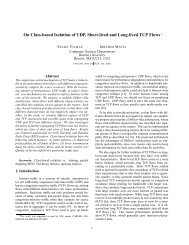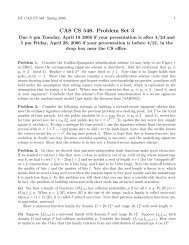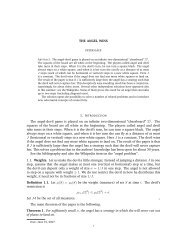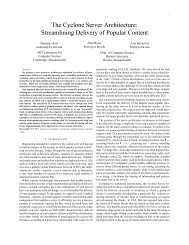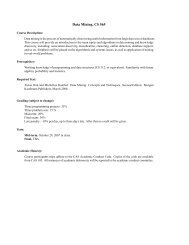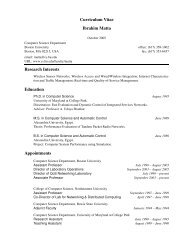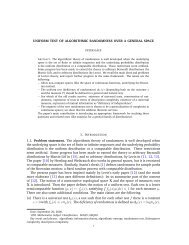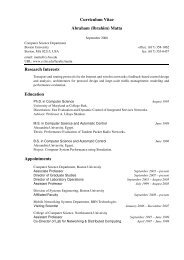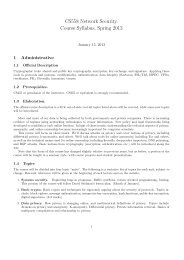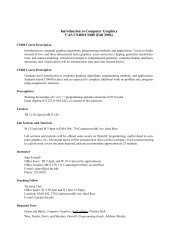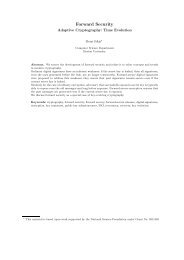Curriculum Vitae Abraham (Ibrahim) Matta Research Interests ...
Curriculum Vitae Abraham (Ibrahim) Matta Research Interests ...
Curriculum Vitae Abraham (Ibrahim) Matta Research Interests ...
Create successful ePaper yourself
Turn your PDF publications into a flip-book with our unique Google optimized e-Paper software.
<strong>Abraham</strong> (<strong>Ibrahim</strong>) <strong>Matta</strong> Page 16 of 29<br />
TRAFFIC abstracts low-level properties of network elements using “types” at their input/output interfaces.<br />
These types are derived from various compositional analysis techniques, e.g. network calculus,<br />
control theory, etc. TRAFFIC has been publicly available since March 2006.<br />
13. PREDA<br />
In collaboration with Gabriele Ferrari Aggradi (visiting master’s student from Universita di Firenze<br />
in Italy) and Flavio Esposito, we developed an architecture, we call PREDA, for Predicate Routing<br />
in DTN-over-MANET networks. Predicate routing allows Delay-Tolerant-Network (DTN) users<br />
connected by an underlying Mobile Ad-hoc NETwork (MANET), to declaratively express high-level<br />
policy constraints on the routing of content. For example, a requirement might be to direct all images<br />
captured by camera X, attached to a MANET-only node S, to a DTN node B, for pre-processing and<br />
authorization before sending them to the user at DTN node C. PREDA maps high-level constraints<br />
of DTN nodes to low-level routing predicates within the MANET nodes. To evaluate our system for<br />
different use cases, our prototype testbed uses a Linux system architecture, where User-Mode-Linux<br />
(UML) is deployed to emulate every node with the Ad-hoc On-demand Distance Vector (AODV)<br />
routing protocol at the MANET level, and with or without a DTN Reference Implementation code.<br />
The network simulator ns-2 (ns-emulation version) is used to simulate the wireless connectivity and<br />
mobility of both DTN and MANET nodes.<br />
14. BUtorrent<br />
In collaboration with Flavio Esposito, Pietro Michiardi, Nobuyuki Mitsutake, and Damiano Carra, we<br />
developed BUtorrent (Boston University Torrent), a file-sharing client that modifies the scheduling<br />
of the seed in the BitTorrent protocol. Our seed scheduling algorithm is based on a proportional-fair<br />
sharing approach, whereby pieces of the file with higher short-term demand, but lower long-term<br />
service rate, are served by the seed at higher priority. This ensures that, while meeting instantaneous<br />
need, pieces (replicas) are equally distributed within the network, thus improving the file-exchange<br />
rate among peers.<br />
Selected Talks and Colloquia<br />
“Networking is IPC”: A Guiding Principle to a Better Internet<br />
Computer Science, Purdue University April 2009<br />
ReArch ’08 - Re-Architecting the Internet, Madrid, SPAIN December 2008<br />
How about Internet 3.0?<br />
Faculty Talk Series, Computer Science, Boston University October 2008<br />
An IPC-based Approach to Network Control and Management<br />
SNC (Sensor Network Consortium) Workshop, The CISE Center, Boston University May 2008<br />
JTP: An Energy-conscious Transport Protocol for Multi-hop Wireless Networks<br />
Systems Faculty <strong>Research</strong> Workshop, The CISE Center, Boston University January 2008<br />
What is the Next Key Technology?<br />
Panel at Sprint <strong>Research</strong> Retreat, Reston, VA June 2007<br />
An Adaptive Management Approach to Resolving BGP Policy Conflicts<br />
Cisco Systems, Foxboro, MA July 2007<br />
The IFIP Networking 2007, Atlanta, Georgia May 2007





